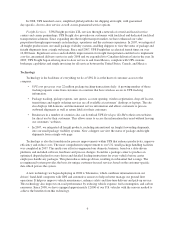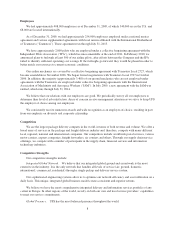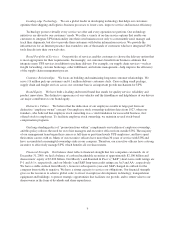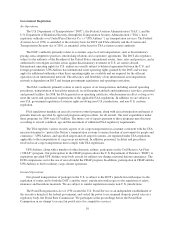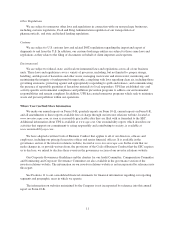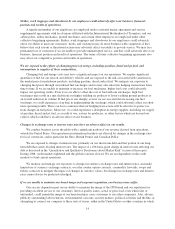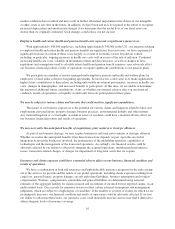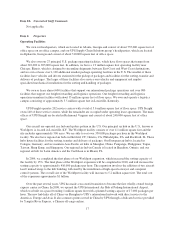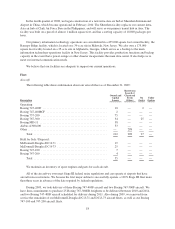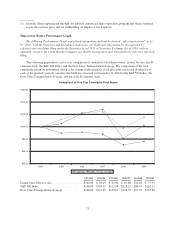UPS 2009 Annual Report Download - page 26
Download and view the complete annual report
Please find page 26 of the 2009 UPS annual report below. You can navigate through the pages in the report by either clicking on the pages listed below, or by using the keyword search tool below to find specific information within the annual report.Strikes, work stoppages and slowdowns by our employees could adversely affect our business, financial
position and results of operations.
A significant number of our employees are employed under a national master agreement and various
supplemental agreements with local unions affiliated with the International Brotherhood of Teamsters, and our
airline pilots, airline mechanics, ground mechanics and certain other employees are employed under other
collective bargaining agreements. Strikes, work stoppages and slowdowns by our employees could adversely
affect our ability to meet our customers’ needs, and customers may do more business with competitors if they
believe that such actions or threatened actions may adversely affect our ability to provide service. We may face
permanent loss of customers if we are unable to provide uninterrupted service, and this could adversely affect our
business, financial position and results of operations. The terms of future collective bargaining agreements also
may affect our competitive position and results of operations.
We are exposed to the effects of changing prices of energy, including gasoline, diesel and jet fuel, and
interruptions in supplies of these commodities.
Changing fuel and energy costs may have a significant impact on our operations. We require significant
quantities of fuel for our aircraft and delivery vehicles and are exposed to the risk associated with variations in
the market price for petroleum products, including gasoline, diesel and jet fuel. We mitigate our exposure to
changing fuel prices through our indexed fuel surcharges and we may also enter into hedging transactions from
time to time. If we are unable to maintain or increase our fuel surcharges, higher fuel costs could adversely
impact our operating results. Even if we are able to offset the cost of fuel with our surcharges, high fuel
surcharges may result in a mix shift from our higher yielding air products to lower yielding ground products or
an overall reduction in volume. If fuel prices rise sharply, even if we are successful in increasing our fuel
surcharge, we could experience a lag time in implementing the surcharge, which could adversely affect our short-
term operating results. There can be no assurance that our hedging transactions will be effective to protect us
from changes in fuel prices. Moreover, we could experience a disruption in energy supplies, including our supply
of gasoline, diesel and jet fuel, as a result of war, actions by producers, or other factors which are beyond our
control, which could have an adverse affect on our business.
Changes in exchange rates or interest rates may have an adverse affect on our results.
We conduct business across the globe with a significant portion of our revenue derived from operations
outside the United States. Our operations in international markets are affected by changes in the exchange rates
for local currencies, and in particular the Euro, British Pound, and Canadian Dollar.
We are exposed to changes in interest rates, primarily on our short-term debt and that portion of our long-
term debt that carries floating interest rates. The impact of a 100-basis-point change in interest rates affecting our
debt is discussed in the “Quantitative and Qualitative Disclosures about Market Risk” section of this report.
During 2008, credit markets tightened and the global economy slowed. We are not dependent on the credit
markets to fund current operations.
We monitor and manage our exposures to changes in currency exchange rates and interest rates, and make
limited use of currency exchange contracts, over the counter option contracts, commodity forwards, swaps and
futures contracts to mitigate the impact of changes in currency values, but changes in exchange rates and interest
rates cannot always be predicted or hedged.
If we are unable to maintain our brand image and corporate reputation, our business may suffer.
Our success depends in part on our ability to maintain the image of the UPS brand and our reputation for
providing excellent service to our customers. Service quality issues, actual or perceived, even when false or
unfounded, could tarnish the image of our brand and may cause customers to use other companies. Also, adverse
publicity surrounding labor relations, environmental concerns, security matters, political activities and the like, or
attempting to connect our company to these sorts of issues, either in the United States or other countries in which
14




